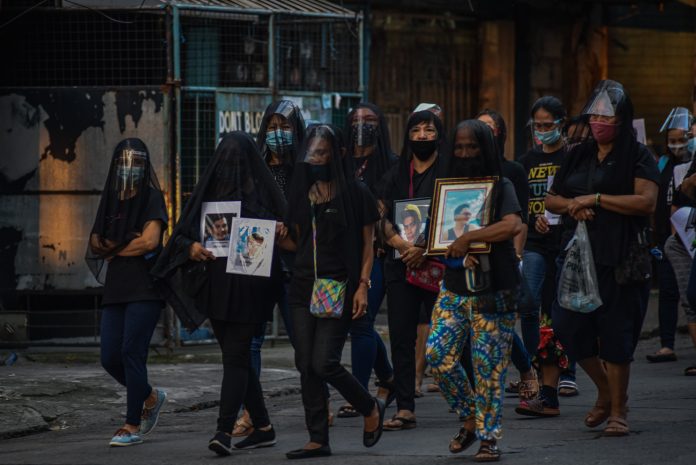Reflection for the 3rd Sunday of Easter (Cycle B)
“Suffering” may be viewed differently from varying contexts but for this essay, we may venture in the meantime on a common understanding that “sufferings” are “experienced circumstances that deny what would make one happy in the world.”
“Happiness” may also be seen in a multitude of ways, but it may refer to “experiences as a result of receiving or having received what one needs or desires in life.”
In these operational definitions, “suffering” may now more completely refer to “the experience of not receiving what one needs or desires” such as adequate food or shelter, a basic education, appropriate healthcare, or any presumed share in the abundance of natural providence. Easily, “suffering” may be associated with inadequacies that are physically real such as loss of life or property, or a permanent incapacitation; or an encounter with tragedy, disaster, or a malignant malady; but not so easily with inadequacies that are personally felt such as anxiety, emotional distress, a perceived loss of dignity, etc.
But in any case, “suffering” in all its actual or imagined forms, would be a disturbance of such magnitude that one may seriously contemplate leaving the world in which a renewed experience of “happiness” seems impossible.
In today’s readings on the question of Christian suffering, two aspects of human suffering may be reflected upon: if one deserves it or not; and if one accepts it or not. From these aspects, four paradigms can emerge: a suffering that is deserved and eventually accepted; a suffering that is not deserved and not accepted; a suffering that is deserved, but not accepted; and a suffering that is undeserved but eventually accepted.
The first two paradigms, we can call “justice.” It arises from an obvious human notion that no one must receive what is undeserved, or that everyone must received what each deserves. The third paradigm, we can call “injustice.” It arises from an obvious human abhorrence to a situation of a flawed “justice,” when one rationalizes the refusal of a suffering which many think he deserves; or when one passively accepts a suffering which many think she does not deserve.
Insofar as the limits of human judgment is concerned, “justice” is the norm through which harmony and peace can be achieved, and thus provides the ordinate reference against which inordinate “injustice” is corrected.
Simply said, our efforts at maintaining justice are confined to ensuring that a person deserving to suffer, must suffer; or that a person undeserving of suffering, must be relieved of it by “redistributing” the same to those who caused it. This view of human justice is behind the facet of a vengeful spirit in human nature that is satiated only through self-gratification by destroying what it deems to be worthy of destruction which for example, underlies the rationale of capital punishment.
Our Lord however, by his example is teaching us – as he had done to his disciples – the perplexing paradox that a kingdom of justice is not won simply through the exercise of the same justice. The end is not the same as the means to itself, bringing us to the fourth paradigm which is difficult to define.
What can we call the “acceptance of undeserved suffering?” Foolishness? But the Christ is keen to point out that “if I can actively deny myself what I deserve or what is important to me,” so that “I can give what you deserve or what is important to you,” then everyone will receive what they deserve for as long as everyone is prepared to forego and give it away! Naturally, he never intended that all undeserved suffering should be accepted for its own sake, but only at the critical moments when our Christian service recognizes the need to correct injustice.
This fourth paradigm, we can call “charity” or “mercy.” It arises from a supernatural effort to give oneself for another. It is in the “suffering” of lowering our pride that compels us to reach out to others, and that inspires others to reach out to us. It is in the “suffering” of detaching ourselves from our excess and comforts that we can strengthen those who have nothing for themselves to secure a decent life. It is in the “suffering” in social action that we can courageously admonish those who are unjust to become just.
It is this suffering that as Peter reminds us, is the fate and witness of those prophets who insist on speaking the truth. It is this suffering which the Christ explained on the road to Emmaus that will remedy injustice to achieve justice, a calling if and when accepted will illuminate our Father’s love, hence winning the peace that only he can give. It is a suffering that is actually victorious … a pain that heals … a death that awakens, resurrects and rebuilds.
May we accompany our Lord as he teaches us on the road to the kingdom of God. It is the road that must be taken.
Brother Jess Matias is a professed brother of the Secular Franciscan Order. He serves as minister of the St. Pio of Pietrelcina Fraternity at St. Francis of Assisi Parish in Mandaluyong City, coordinator of the Padre Pio Prayer Groups of the Capuchins in the Philippines and prison counselor and catechist for the Bureau of Jail Management and Penology.
The views expressed in this article are the opinions of the author and do not necessarily reflect the editorial stance of LiCAS.news.









